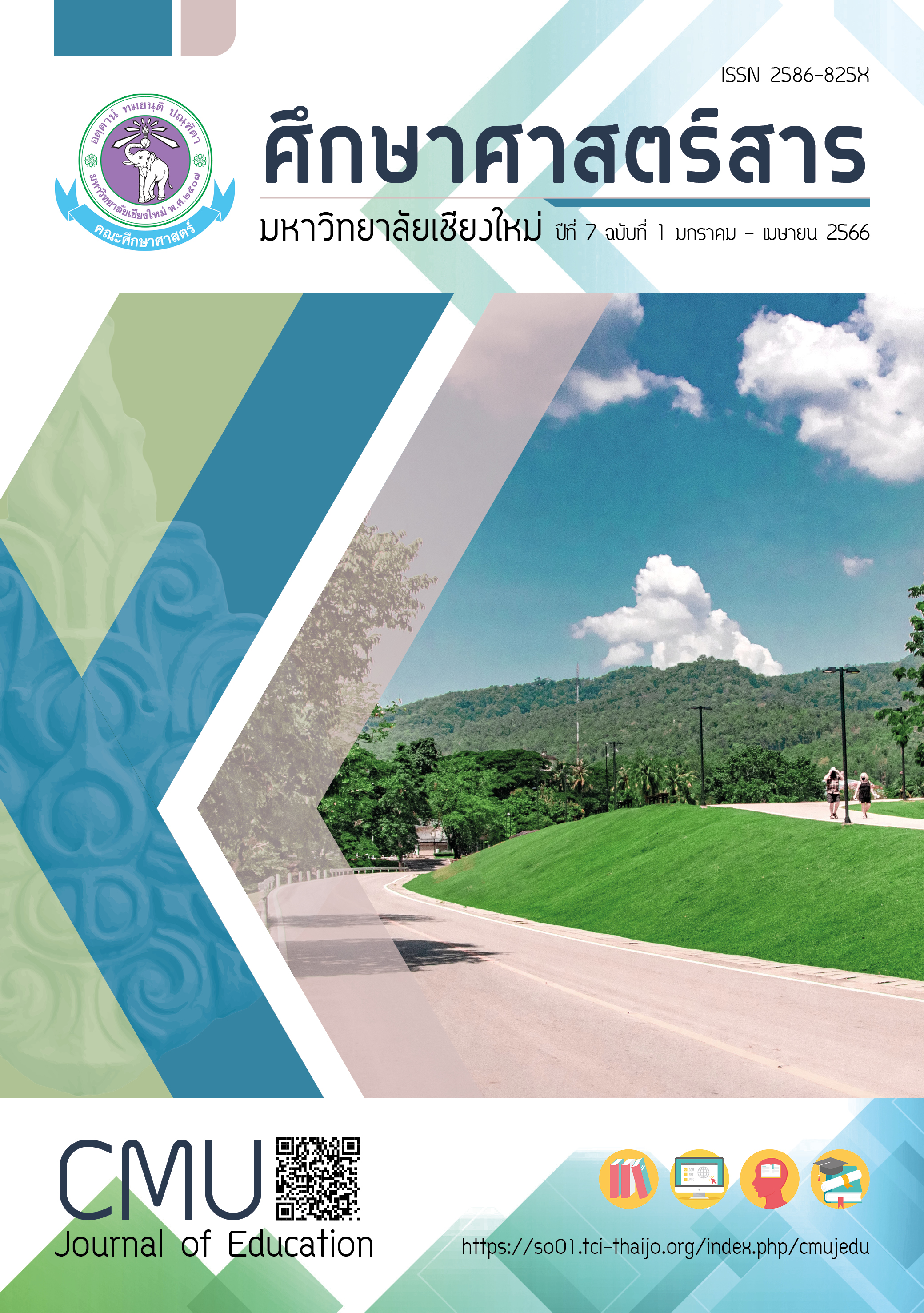การพัฒนาแบบวัดความเชื่อด้านความรู้ทางวิทยาศาสตร์ของนิสิตนักศึกษาครู
Main Article Content
บทคัดย่อ
การวิจัยครั้งนี้ มีวัตถุประสงค์เพื่อพัฒนาแบบวัดความเชื่อด้านความรู้ทางวิทยาศาสตร์ของนิสิตนักศึกษาครู ดำเนินการเก็บรวบรวมข้อมูลโดยใช้แบบวัดความเชื่อด้านความรู้ทางวิทยาศาสตร์ที่พัฒนาขึ้น มีลักษณะเป็นมาตรประมาณค่า 5 ระดับ ตัวอย่างวิจัย คือ นิสิตนักศึกษาครูวิทยาศาสตร์ จำนวน 130 คน ผลการวิจัยพบว่า 1) แบบวัดความเชื่อด้านความรู้ทางวิทยาศาสตร์ของนิสิตนักศึกษาครูประกอบด้วยองค์ประกอบ 4 ด้าน คือ ความแน่นอนของความรู้ พัฒนาการของความรู้ แหล่งความรู้ และการให้เหตุผลเพื่อให้ได้ความรู้ จำนวน 28 ข้อ 2) แบบวัดความเชื่อด้านความรู้ทางวิทยาศาสตร์ผ่านการประเมินความตรงเชิงเนื้อหาโดยผู้เชี่ยวชาญ (ค่าเฉลี่ย I-CVI =.82) มีความเที่ยงแบบสอดคล้องภายในระหว่าง .774 -.866 และมีผลความตรงเชิงโครงสร้างจากการตรวจสอบความสอดคล้องของโมเดลความเชื่อด้านความรู้ทางวิทยาศาสตร์กับข้อมูลเชิงประจักษ์ (Chi-square(3, n=130) = 3.292, p= .348 ; CFI =.998 TLI=.997, RMSEA= .027 SRMR=.182)
Article Details

อนุญาตภายใต้เงื่อนไข Creative Commons Attribution-NonCommercial-NoDerivatives 4.0 International License.
หากผู้เสนอบทความมีความจำเป็นเร่งด่วนในการตีพิมพ์โปรดส่งลงตีพิมพ์ในวารสารฉบับอื่นแทน โดยกองบรรณาธิการจะไม่รับบทความหากผู้เสนอบทความไม่ปฏิบัติตามเงื่อนไขและขั้นตอนที่กำหนดอย่างเคร่งครัด ข้อมูลของเนื้อหาในบทความถือเป็นลิขสิทธิ์ของ Journal of Inclusive and Innovative Education คณะศึกษาศาสตร์ มหาวิทยาลัยเชียงใหม่
เอกสารอ้างอิง
กอบแก้ว สิงหเนตรวัฒน์ และไพโรจน์ เติมเตชาติพงศ์ (2555). การศึกษาความเข้าใจมโนมติทางวิทยาศาสตร์และ ความสัมพันธ์ระหว่างความเชื่อในแรงจูงใจกับการเปลี่ยนแปลงมโนมติ เรื่องการรักษาดุลยภาพของเซลล์ ชั้น มัธยมศึกษา ปีที่ 4 ด้วยกิจกรรมการเรียนรู้ แบบ Predict-Observe-Explain (POE). วารสารศึกษาศาสตร์มหาวิทยาลัยขอนแก่น, 35(2), 7-15.
มยุรฉัตร ยลวิลาศ และปาริชาติ แสนนา. (2563). การสร้างแบบจำลองทางวิทยาศาสตร์ เรื่อง เซลล์และการแบ่งเซลล์แบบไมโทซิส โดยการจัดการเรียนรู้โดยใช้แบบจำลองเป็นฐาน และความเชื่อทางญาณวิทยาทางวิทยาศาสตร์ ของนักเรียนชั้นมัธยมศึกษาปีที่ 4. ใน การประชุมวิชาการและนำเสนอผลงานวิจัยระดับชาติและนานาชาติ ครั้งที่ 7 : นวัตกรรมการเรียนรู้สู่การพัฒนาชุมชน (น.296 -306). กรุงเทพมหานคร: มหาวิทยาลัยราชภัฏสวนสุนันทา.
วิชญาดา นวกิจบำรุง และสลา สามิภักดิ์. (2562). ความเชื่อของครูวิทยาศาสตร์: ทบทวนวรรณกรรมและแนวทางการศึกษา. วารสารหน่วยวิจัยวิทยาศาสตร์ เทคโนโลยี และสิ่งแวดล้อมเพื่อการเรียนรู้, 10(2), 300 -314.
วิษนุกร นามมุงคุณ, ไชยพงษ์ เรืองสุวรรณ และ Fang-Ying Yang. (2563). ความเชื่อว่าด้วยความรู้ทางวิทยาศาสตร์ของนักเรียน มัธยมศึกษาตอนปลาย. ศึกษาศาสตร์สาร มหาวิทยาลัยเชียงใหม่, 4(1), 37-49.
ศิริชัย กาญจนวาสี.(2560). ทฤษฎีการทดสอบแบบดั้งเดิม (classical test theory). กรุงเทพมหานคร: โรงพิมพ์จุฬาลงกรณ์มหาวิทยาลัย.
สุปราณี จำปา (2548). การวิเคราะห์องค์ประกอบเชิงยืนยันความเชื่อเร่ืองความรู้ ของนักเรียนชั้นมัธยมศึกษาปีที่ 3. วารสารวิจัย และวัดผลทางการศึกษา, 3(1), 83-97.
อมรรัตน์ ท้วมรุ่งโรจน์. (2560). ข้อพึงระวังในการใช้แบบสอบถามสำหรับเก็บข้อมูลจากแหล่งเดียวในบริบทของประเทศเอเชีย ตะวันออก. วารสารวิชาการบริหารธุรกิจ, 6(2), 11-23.
Almanasreh, E., Moles, R., & Chen, T. F. (2019). Evaluation of methods used for estimating content validity. Research in social and administrative pharmacy, 15(2), 214-22.
Chen, J. A. (2012). Implicit theories, epistemic beliefs, and science motivation: A person-centered approach. Learning and Individual Differences, 22, 724-735.
Conley, A. M., Pintrich, P. R., Vekiri, I., & Harrison, D. (2004). Changes in epistemological beliefs in elementary science students. Contemporary Educational Psychology, 29, 186–204.
Ekinci, N. (2017). Examining the relationships between epistemological beliefs and teaching and learning conceptions of lower-secondary education teachers. İnönü Üniversitesi Eğitim Fakültesi Dergisi, 18(1), 344-358.
Fujiwara, T., Laulathaphol, P., & Phillips, B. J. (2012). Thai university students’ scientific epistemic beliefs: Relationships with past learning experiences. Procedia-Social and Behavioral Sciences, 69, 187-196.
Greene, J. A., Sandoval, W. A., & Bråten, I. (2016). Handbook of epistemic cognition. New York: Routledge.
Guilfoyle, L., McCormack, O., & Erduran, S. (2020). The" tipping point" for educational research: The role of pre-service science teachers’ epistemic beliefs in evaluating the professional utility of educational research. Teaching and Teacher Education, 90, 103033.
Gunes, G., & Bati, K. (2018). Development of a Scale on Scientific Epistemological Views and Investigation of Epistemological Views of Prospective Teachers. International Journal of Research in Education and Science, 4(2), 391-408.
Hoffer, B. K. (2001). Personal epistemology research: Implications for learning and teaching. Educational Psychology Review, 13, 353–383.
Hoffer, B. K., & Pintrich, P. R. (1997). The development of epistemological theories: Beliefs about knowledge and knowing and their relation to learning. Review of Educational Research, 67, 88–140.
Johnson, K., & Willoughby, S. (2018).Changing epistemological beliefs with nature of science implementations. Physical Review Physics Education Research, 14(1), 010110-1-14.
Kampa, N., Neumann, I., Heitmann, P., Kremera, K. (2016). Epistemological beliefs in science—a person-centered approach to investigate high school students' profiles. Contemporary Educational Psychology, 46, 81–93.
Kitchener, R. F. (2002). Folk epistemology: An introduction. New Ideas in Psychology, 20(2), 89-105.
Kizilgunes, B., Tekkaya, C., & Sungur, S. (2009). Modeling the relations among students’ epistemological beliefs, motivation, learning approach, and achievement. The Journal of Educational Research, 102, 243–255.
Liang, J. C., & Tsai, C. C. (2010). Relational analysis of college science‐major students’ epistemological beliefs toward science and conceptions of learning science. International Journal of Science Education, 32(17), 2273-2289.
Mason, L., Boscolo, P., Tornatora, M. C., & Ronconi, L. (2013). Besides knowledge: A cross-sectional study on the relations between epistemic beliefs, achievement goals, self-beliefs, and achievement in science. Instructional Science, 41, 49–79.
Muis, K. R., Bendixen, L. D., & Haerle, F. C. (2006). Domain-generality and domain-specificity in personal epistemology research: Philosophical and empirical reflections in the development of a theoretical framework. Educational Psychology Review, 18(1), 3-54.
Nussbaum, E. M., Sinatra, G. M., & Poliquin, A. (2008). Role of epistemic beliefs and scientific argumentation in science learning. International Journal of Science Education, 30(15), 1977-1999.
Polit, D. F., & Beck, C. T. (2006). The content validity index: are you sure you know what's being reported? Critique and recommendations. Research in nursing & health, 29(5), 489-497.
Qian, G., Alvermann, D. E. (2000) Relationship between epistemological beliefs and conceptual change leaning. Reading & Writing Quarterly: Overcoming Learning Difficulties, 16(1), 59-74.
Rongbutsri, N., & Yuan, F. (2021). Perspective of Thai CFL teachers of ICT application in their teaching: A case study of Chiang Rai primary and aecondary schools. Journal of Education Khon Kaen University, 44(1), 13-33.
Schommer, M. (1994). Synthesizing epistemological belief research: Tentative understandings and provocative confusions. Educational Psychology Review, 6, 293–319.
Soper, D.S. (2022). A-priori Sample Size Calculator for Structural Equation Models [Software]. Retrieved from https://www.danielsoper.com/statcalc.
Sosu, E. M., & Gray, D. S. (2012). Investigating change in epistemic beliefs: An evaluation of the impact of student teachers’ beliefs on instructional preference and teaching competence. International Journal of Educational Research, 53, 80-92.
Trautwein, U., & Lüdtke, O. (2007). Epistemological beliefs, school achievement, and college major: A large-scale longitudinal study on the impact of certainty beliefs. Contemporary Educational Psychology, 32, 348–366.
Tsai, C. C., Jessie Ho, H. N., Liang, J.-C., & Lin, H.-M. (2011). Scientific epistemic beliefs, conceptions of learning science and self-efficacy of learning science among high school students. Learning and Instruction, 21, 757–769.
Vigil Colet, A., Navarro González, D., & Morales Vives, F. (2020). To reverse or to not reverse Likert-type items: That is the question. Psicothema, 32, 108-114.
Wu, D., Liao, T., Yang, W., & Li, H. (2021). Exploring the relationships between scientific epistemic beliefs, science teaching beliefs and science-specific PCK among pre-service kindergarten teachers in China. Early Education and Development, 32(1), 82-97.
Yang, F. Y., Bhagat, K. B., & Cheng, C. H. (2019) Associations of epistemic beliefs in science and scientific reasoning in university students from Taiwan and India, International Journal of Science Education, 41(10), 1347-1365.


